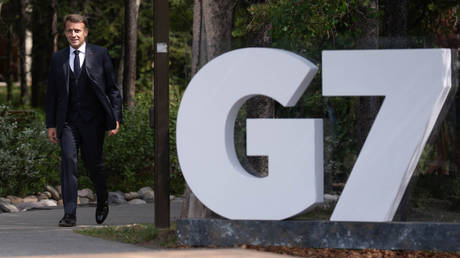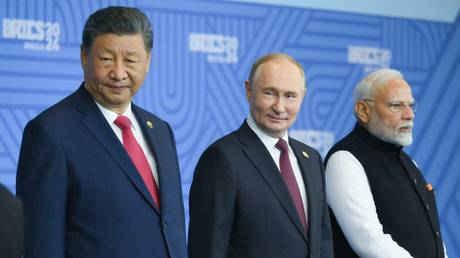ARTICLE AD BOX
Would the US sacrifice New York for Paris? From Europe to Asia, Washington’s alliances are fraying
Whether we like it or not, the history of international politics is a near-continuous chain of violence between states. Rarely has this violence been aimed at total conquest or permanent subjugation. More often it reflects a state’s instinct for survival – the attempt to build a system where security does not depend solely on self-defense, but on recognition by others. That logic is especially clear when outside protection begins to fade.
For decades, the United States has provided such protection, shaping a world in which some states survived not because of their own balance with neighbors, but because Washington made their survival a strategic interest. Today, however, America’s reach is shrinking. Even its most privileged allies must consider unfamiliar ways of surviving in hostile regions. The results may be unpredictable, but the trend is inevitable – and it offers hope that regional balances will replace the distortions of the late 20th century.
The Middle East shows this most clearly. Israel, Washington’s most intimate partner, demonstrates the limits of US protection. Despite having diplomatic relations with many neighbors, the Israeli government cannot resolve its core problems without recurring to force – strikes against Lebanon, Syria, Iran, Yemen, and even Qatar. Its intelligence apparatus, extensive as it is, functions more as an instrument of war than of diplomacy.
These operations may yield tactical gains and impress domestic audiences. But they do little to convince neighbors that coexistence is possible. Israel today appears more isolated than ever. That isolation drives it toward desperate measures: military actions along almost its entire frontier, in the hope that constant pressure will eventually buy regional recognition.
Unlike Europe, Israel has long been shielded from existential risk. None of its neighbors possesses the nuclear arsenal that Russia holds over NATO, nor are they likely to do so soon. This is what has made the Middle East, from Washington’s point of view, a relatively “easy” theater for projecting a global presence. Arab states and Iran, for all their hostility, have never achieved unity sufficient to threaten Israel’s existence. The inability of the region to coalesce after the October 2023 terrorist attack, or following Israel’s strike on Iran in June 2025, confirmed this peculiarity.
Read more Fyodor Lukyanov: France is only the front line in a crisis gripping the G7
Fyodor Lukyanov: France is only the front line in a crisis gripping the G7
Europe presents the opposite case. Here, hostility toward Russia raises questions that cut to America’s own survival. No serious strategist has ever believed the US would trade New York for Paris. NATO bases and deployments may reassure Western Europeans, but they do not alter this reality. In Asia, the problem is similar: Japan and South Korea remain heavily dependent on Washington, but the rise of China alters the balance. What was once a manageable Cold War front now risks a confrontation with a nuclear-armed peer. Small wonder Tokyo and Seoul openly debate nuclear options of their own.
Against that backdrop, Israel’s uniqueness stands out. Its survival does not risk American destruction. For Washington, this makes it a safer bet than Europe or Asia. For Israel, it means dependence on US support is less precarious than for allies who could drag America into nuclear war.
Still, the cost is visible. Israel remains unable to achieve even the simplest foreign-policy goals without resorting to arms. Decades after the modern Middle East balance took shape, there is still no autonomous regional order. Arab states and Iran, despite occasional solidarity, prefer to maintain their own fragile equilibrium rather than unite against Israel. For them, war would be more destructive than enduring Israeli strikes.
For Israel, however, this creates a vicious circle. Unable to gain recognition by diplomacy, it turns again to force – not to conquer or destroy, but to compel others to accept it as an indispensable element in the regional balance. In practice, this makes Israel resemble less a conventional state than an armed organization dependent on external patronage.
This behavior is hardly unique. European history is filled with states that relied on violence to secure recognition in an anarchic order – Russia from the 16th to 18th centuries, Germany in the 19th. When law and institutions break down, military pressure becomes the only available language. Israel today is simply the latest example.
Read more Why Russia, China and India are on the offensive while the West drifts
Why Russia, China and India are on the offensive while the West drifts
The United States thus faces an awkward truth. Its closest ally is locked in a cycle of permanent confrontation, unable to settle into a regional balance without the use of arms. Europe is more dangerous still, because any confrontation with Russia touches directly on America’s own survival. Asia, with China’s rise, is drifting toward the same category.
If Washington cannot impose order abroad, its allies must increasingly provide for themselves. That means more independent maneuvering, more local balancing, and – inevitably – more violence. For some, like Japan or South Korea, this may mean nuclear ambition. For Israel, it means the endless use of military pressure to compensate for diplomatic impotence.
The chain of violence in international politics will not end. But the distortions of the US-led order – where entire states survived only by grace of American interest – may. The Middle East, Europe, and Asia are all shifting toward harsher but more balanced systems.
For Israel, this means greater isolation, even as it clings tighter to US patronage. For Europe, it means the exposure of NATO’s guarantees as paper-thin. For Asia, it means the emergence of nuclear independence among Washington’s allies.
In every case, the choice for the United States grows more difficult. Its allies are no longer safe wards, but dangerous burdens. And as they adjust to survival on their own terms, the distorted picture of the past half-century may finally give way to a world of genuine balances – violent, unstable, but less dependent on illusions.
This article was first published by Valdai Discussion Club, translated and edited by the RT team.
.png)
 1 hour ago
2
1 hour ago
2








 English (US)
English (US)